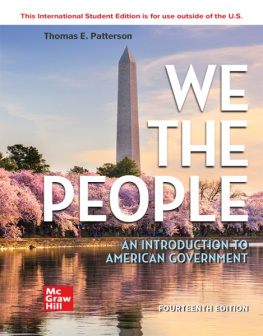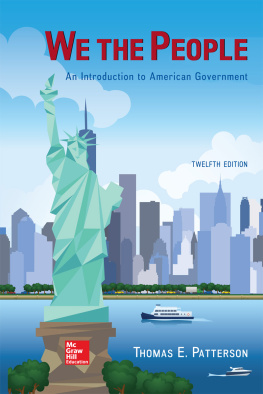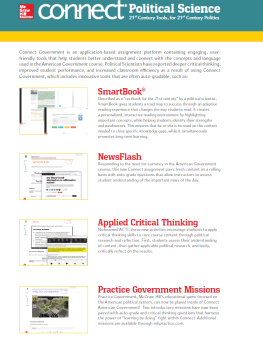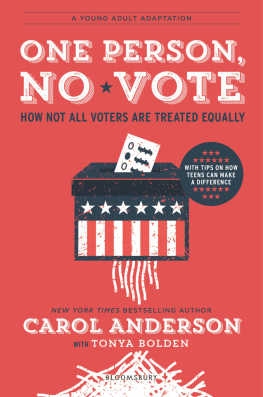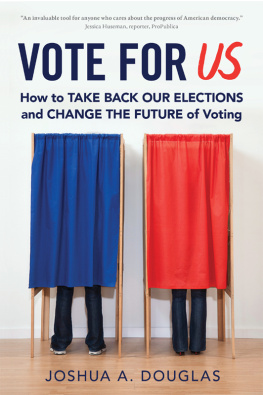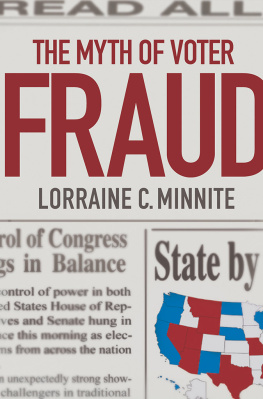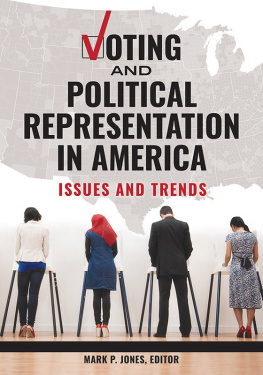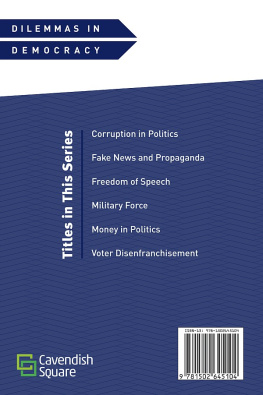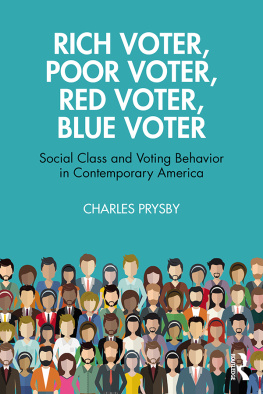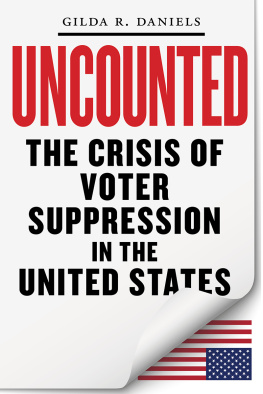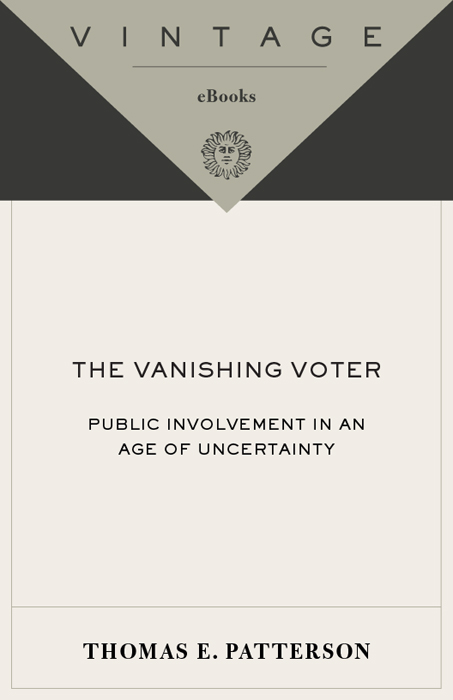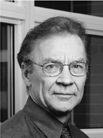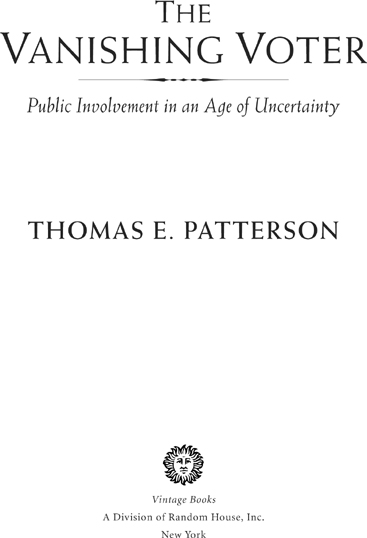A multifaceted treatment of a continuing public problem. Readable and important.
Engaging. Provocative required reading for the public policy-minded.
Pattersons book isnt just another tired lament about the lameness of the political process. Its an extension of the Vanishing Voter Project, designed to discover what draws people to a campaign and what keeps them away.
Well-reasoned. Offering pragmatic reforms, Pattersons descriptions and prescriptions merit mulling by politically minded readers.
Outstanding. A well-documented project that leads the reader through what works and what fails in our system, and how we can continue our representative republic and make it more responsive to the wishes of the electorate in the future.
ALSO BY THOMAS E. PATTERSON
Thomas E. Patterson is the Bradlee Professor of Government and the Press at Harvard Universitys John F. Kennedy School of Government. For many years he taught at Syracuse University. He is the author of several other books on politics and the media, including Out of Order, which won the American Political Science Associations 2002 Doris Graber Award for the best book in the field of political communication, and The Unseeing Eye, which was named one of the fifty most influential books of the past half century in the field of public opinion by the American Association for Public Opinion Research. He lives in Brookline, Massachusetts.
Contents
ONE
TWO
THREE
FOUR
FIVE
SIX
Acknowledgments
As a child growing up in a small Minnesota town, I remember elections as a time of activity and wonder. With eight children, my mom and dad voted in shifts, but vote they always did. Many of my grade-school classmates sported campaign pins. The I Like Ike buttons were more popular, but I wore my Adlai Stevenson pin proudly, even though something told me that ours was a losing cause. Campaign leaflets would appear at the house in the hands of neighbors or slipped between the doors. They were also found on store counters or on windshields when farmers came into town on Saturday night. Campaign posters were slapped on posts or taped to store windows. Summer evenings were spent watching the party conventions. There wasnt anything else available on TV, but the conventions would have been the program of choice in most homes anyway.
Elections dont look and feel like that anymore, and havent for a long time. During the past four decades, the United States has had its longest sustained period of decline in election participation, including but not limited to the vote. Elections are now conducted on high, beamed from war rooms and newsrooms. We are invited to send a check and to vote on Election Day. Increasingly, we dont bother to do either one.
It is mythical, of course, to claim that elections were once bottom-up affairs that thrived solely on the effort and interest of ordinary citizens. But todays elections are unmistakably top-down affairs, conducted in ways that suit candidates, journalists, and officials. These professionals are not unmindful of or uncaring about the public, but they put their own needs first. The gap between the practitioner and the citizendespite the intimacy of television and the immediacy of pollinghas arguably never been greater. The world occupied by the hundreds at the top and the world populated by the millions at the bottom still overlap at points, but they do so less satisfactorily than before. The juice has been squeezed out of elections. The blinkered professionalism that marks other areas of American life has taken over politics and journalism, which are among the areas of modern life that actually work better when a spirit of amateurism prevails.
Absent that spirit, Americans are likely to continue to withhold their checks, their votes, and their attention. This prospect led to the Vanishing Voter Project on which this book is based. With the generous support of the Pew Charitable Trusts, we conducted weekly interviews with national samples of 1,000 Americans to discover how much attention they were paying to the 2000 presidential election campaign. We sought to discover what draws people to a campaign and what keeps them away. We did a lot of interviewing. Todays campaign lasts a full year, easily the longest among the worlds major democracies. By the time the 2000 campaign ended, we had conducted nearly 90,000 interviews. We had not expected the outcome to go into overtime. But it did, and so did we, gathering an additional 10,000 interviews while Americans waited to hear whether George W Bushs or Al Gores legal team would win out.
Our Vanishing Voter Project benefited from the advice of a great many scholars, practitioners, foundation officers, and staff members. I begin my thanks with Sean Treglia of The Pew Charitable Trusts, who was the program officer for our research grant. Sean provided sound advice at critical stages of the project and represented Pew with distinction at our public forums. I am also indebted to Paul Light, who was at Pew when we proposed the project. Pauls backing was crucial. I am grateful for it, as well as for the support received from Michael Delli Carpini, Pews Public Policy Program director, and Rebecca Rimel, Pews president. Through its many grants, The Pew Charitable Trusts has made a singular contribution to improving American democracy. It is a towering force in our civic life. It is also a hands-off foundation once a grant has been awarded. The opinions expressed in this book are my own and do not necessarily reflect the views of The Pew Charitable Trusts.
Throughout the Vanishing Voter Projectliterally from beginning to endI had support, counsel, and friendship from Marvin Kalb. Marvin and I hatched the idea of the project, secured funding for it, and directed it together. Marvins experiences in journalism and the academy helped shape every aspect of the study. To my delight, but not to my amazement after having already worked with him for several years, Marvin was adept even at devising survey questions. Marvin also pulled together our two successful Washington conferences and our two stunning national party convention forums. Always generous in his advice and polite in his disagreements, Marvin is what one hopes for, and is lucky to find, in a collaborator and colleague.
The Vanishing Voter Project was also fortunate to have a dedicated research and administrative team. Tami Buhr was in charge of preparing the survey questions each week and getting the data in shape for analysis. She also participated in the preparation of the weekly news releases, our conference papers, and this book. Once the surveys were off and running, Tami was easily the projects most valuable player. I am thankful for her many efforts, some of which required her to work evenings and weekends. She is a marvelously talented research scholar and deserves a large chunk of the credit for the projects success. The Webmaster for our project was Ben Snowden, a skilled refugee from the private sector who is now in law school. Ben set up our Web site (www.vanishingvoter.com) and took charge of sending out our weekly news releases. The task of monitoring news coverage of the 2000 campaign fell to Alison Kommer. The data she so painstakingly prepared have found their way into this book. Also helping to shape the book were two first-rate editorial assistants, Parker Everett and Lynn Weil. Eric Anderson ably assisted in tracking news coverage of the project and in routing inquiries about the project to their proper place. Karen Hart capably handled the project budget. In Washington, Marvin Kalb had the assistance of Michael Barre. At the start of the project, my personal assistant was Melissa Ring. After the book was under way, Jamie Arterton moved into the position. Melissa and Jamie did it all, from helping with project inquiries to assisting in manuscript preparation. These two very talented young women learned to work around my chronic disorganization, imposing an order on the project that was a marvel to all in the office.


